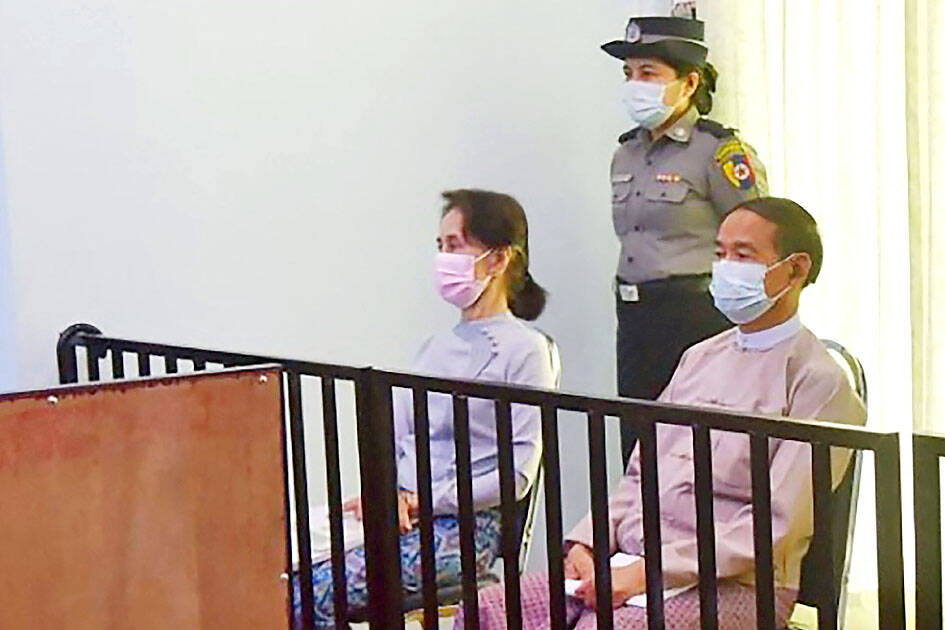Myanmar’s junta is endangering the life of jailed democracy figurehead Aung San Suu Kyi, her political party said yesterday, accusing the military of depriving her of medical care and food.
Aung San Suu Kyi has been detained since the generals seized power in February 2021, ending a 10-year democratic experiment and plunging the Southeast Asian country into turmoil.
In the past few days, local media have reported that the Nobel laureate, 78, was having dizzy spells, vomiting and unable to eat because of a tooth infection.

Photo: AFP / MYANMAR’S MINISTRY OF INFORMATION
“We are particularly concerned that she is not receiving adequate medical care and they are not providing healthy food nor accommodation sufficiently with the intention to risk her life,” the National League for Democracy said.
“If Daw Aung San Suu Kyi’s health is not only impaired, but her life also is endangered, the military junta is solely responsible,” the statement said, using a Burmese honorific.
During her 19-month trial in a junta court, Aung San Suu Kyi regularly missed hearings on health grounds.
That trial ended last year, with Aung San Suu Kyi jailed for 33 years, a term later partially reduced by junta chief Min Aung Hlaing.
Aung San Suu Kyi’s UK-based son last week told the BBC that the junta was denying treatment to his mother for dizziness and a gum disease, although he is not in direct contact with her.
A junta spokesman told reporters last week that reports of Aung San Suu Kyi’s ill health were “rumors.”
“She’s not suffering from anything as her medical doctors are taking care of her health,” Zaw Min Tun said.
Aung San Suu Kyi was being held as a “hostage ... in secret places,” her party said.

A magnitude 7.0 earthquake struck off Yilan at 11:05pm yesterday, the Central Weather Administration (CWA) said. The epicenter was located at sea, about 32.3km east of Yilan County Hall, at a depth of 72.8km, CWA data showed There were no immediate reports of damage. The intensity of the quake, which gauges the actual effect of a seismic event, measured 4 in Yilan County area on Taiwan’s seven-tier intensity scale, the data showed. It measured 4 in other parts of eastern, northern and central Taiwan as well as Tainan, and 3 in Kaohsiung and Pingtung County, and 2 in Lienchiang and Penghu counties and 1

A car bomb killed a senior Russian general in southern Moscow yesterday morning, the latest high-profile army figure to be blown up in a blast that came just hours after Russian and Ukrainian delegates held separate talks in Miami on a plan to end the war. Kyiv has not commented on the incident, but Russian investigators said they were probing whether the blast was “linked” to “Ukrainian special forces.” The attack was similar to other assassinations of generals and pro-war figures that have either been claimed, or are widely believed to have been orchestrated, by Ukraine. Russian Lieutenant General Fanil Sarvarov, 56, head

FOREIGN INTERFERENCE: Beijing would likely intensify public opinion warfare in next year’s local elections to prevent Lai from getting re-elected, the ‘Yomiuri Shimbun’ said Internal documents from a Chinese artificial intelligence (AI) company indicated that China has been using the technology to intervene in foreign elections, including propaganda targeting Taiwan’s local elections next year and presidential elections in 2028, a Japanese newspaper reported yesterday. The Institute of National Security of Vanderbilt University obtained nearly 400 pages of documents from GoLaxy, a company with ties to the Chinese government, and found evidence that it had apparently deployed sophisticated, AI-driven propaganda campaigns in Hong Kong and Taiwan to shape public opinion, the Yomiuri Shimbun reported. GoLaxy provides insights, situation analysis and public opinion-shaping technology by conducting network surveillance

‘POLITICAL GAME’: DPP lawmakers said the motion would not meet the legislative threshold needed, and accused the KMT and the TPP of trivializing the Constitution The Legislative Yuan yesterday approved a motion to initiate impeachment proceedings against President William Lai (賴清德), saying he had undermined Taiwan’s constitutional order and democracy. The motion was approved 61-50 by lawmakers from the main opposition Chinese Nationalist Party (KMT) and the smaller Taiwan People’s Party (TPP), who together hold a legislative majority. Under the motion, a roll call vote for impeachment would be held on May 19 next year, after various hearings are held and Lai is given the chance to defend himself. The move came after Lai on Monday last week did not promulgate an amendment passed by the legislature that